Driven by a passion for creating opportunities and diversity in the digital media landscape, Rafael Fernandez, Jr. is committed to bringing positive change to the media industry. Over the years, Fernandez has spoken at national conferences and events, as well as mentored other emerging Latino content creators. But Fernandez’s career took time and dedication.
Originally a self-taught web designer, graphic designer and social media manager, Fernandez gained experience in branding and design by helping develop various websites for corporations such as True Trading Group, Vivos and Lisc Bay Area, among others.
Although Fernandez had no experience as a host, with the help of his family and friends the Puerto Rican and Dominicans created “The Latin Babbler Show,” a comedy podcast to help engage and educate audiences about the diversity of the Latino community. Covered with a comedic approach, the podcasts touched on topics like culture, art, food and current events.
Contributions both made by Fernandez and his loved ones helped him launch the podcast in 2020 and now ranks among the top 2 percent globally. The show has accumulated over 23,000 audio downloads and 32,000 views on YouTube since its creation. It later motivated Fernandez to start Wafi Media, a Latino-owned digital media company that he created due to the lack of Latino representation that he noticed in the entertainment community.
In 2019, Latinos/ Hispanics made up approximately 12 percent of workers in the media industry, compared to an estimated 18 percent in the rest of the workforce in different industries, according to the U.S. Government Accountability Office (GAO).
Todo Wafi, one of the networks overseen by Wafi Media, aims to provide its audience with a variety of entertainment multimedia, through news, podcasts, and cultural discussions. Topics ranged from how ‘Hollywood may be suppressing underrepresented voices” to articles on uplifting Latinas and creating safe spaces in the Latino community.
Fernandez decided to create Todo Wafi to help bring more change to the industry. Made up of a diverse group representing various countries in Latin America, such as Puerto Rico, the Dominican Republic, Peru, and many more, each team member is given the opportunity to share their work and is driven to provide a voice celebrating Latin excellence.
Before Fernandez started his journey with “The Latin Babbler Show,” and Todo Wafi, he had many adversities to overcome in his early years. As a single father, Fernandez was responsible for maintaining three kids and ensuring they had everything they needed in life while learning about Web design with limited resources.
“I actually had to sit there and buy those things they called books. I would go to the library or get on the internet and find there were a lot of online resources to learn CSS or HTML. A lot of it was trial and error and me sitting there with a notepad and writing code. And then publishing [the website], adjusting how it looks, and trying to figure out what works best,” Fernandez said.
Fernandez recalled that going through home displacement was one of the few moments where he felt he had hit rock bottom. Losing his home, transitioning through family shelters and being in that situation for 14 years became eye-opening for Fernandez.
Jessica Montalvo has worked with Fernandez in his company for about 18 months as a content contributor and writes articles on mental health, the rich history of Latino culture and the arts. She respects that Fernandez tackles sensitive and timely topics like disrespectful stereotypes, mental health struggles and politics that affect the Latino community. She said that he tries to use his work to help Latinos by tackling tough conversations like body positivity and interviewing Latinos who promote this self-love.
“For Hispanic Heritage Month, he created “Revolución” last year and it was an idea that we brought together quickly. So we knew that for this year, we wanted to make sure that we put enough time and effort into addressing all kinds of different issues,” Montalva continued, “And he wanted to make sure that we are being inclusive of all the diverse Latinos that we have, [like] Asian Latinos or Afro Latinos.”
The panels and discussions were held online and included Indigenous Latinidad, Afro-Latinidad, Latina entrepreneurs, and many others. These online discussions included information about how to embrace our roots, how our representation matters, and the risks that occur within the industry.
Just like the first, the second annual “Revolución” will take place during Hispanic Heritage Month on September 15 and will feature panels, articles and other formats that highlight fine arts, music, mental health and LGBTQIA issues. The free 30-day digital festival will be available to stream on various online platforms, including YouTube, Facebook, LinkedIn, Twitter and the Todo Wafi website.
This year, “Revolución” will host its first red carpet premiere event to showcase two short films and will feature a Latino discussion panel with a Q&A The event will be held at the Directors Guild of America (DGA) Theater complex from 6 p.m. to 10 p.m that day.
The featured short film is “The Kill Floor,” a film about a young Latino reporter (Jaime Zevallos) who returns to his rural hometown after being hit by the COVID-19 pandemic to uncover the urgent and deadly circumstances threatening a meatpacking plant’s workers – including his father (Miguel Najera).
Following is a second short film, “They Come in Colors,” which explores anxiety, its causes and effects and what can be done about it, as the film’s goal is to help bring more awareness around anxiety.
The evening will also include a Latinidad Discussion Panel with a Q & A featuring Yovy Daniels (Host, Chombita Chronicles), Rafael Fernandez Jr (Founder, TodoWafi), Carlos Avila (Writer/Director), Jaime Zevallos (Actor, The Kill Floor), Brianna Fernandez (Creator, “They Come in Colors”), Sylvia Roldán (Story Telling Coach) and moderated by Jon Huertas (Director, Actor, Producer).
Following the program, Special attendees can look forward to a networking reception with a sampling of Dominican Cuisine.
CALÓ NEWS interviewed Fernandez about creating these networks and making his mark for Latinos in the digital media space.

rafael fernandez
Rafael Fernandez Jr., 47, The Latin Babbler and founder of Todo Wafi, He/Him, Dominican and Puerto Rican
HOW DID YOU GET INTO THE DIGITAL MEDIA SPACE? AND WHY DO YOU ENJOY BEING IN THIS SPACE?
I was originally in the Navy. When I became a father. I decided that I’m not going to do the Navy anymore. I’m going to try to see if I can do something with computers because it’s what I really love, so I went to study computer programming. From there, I started doing quality assurance testing for Activision and expert software, and we kind of got at like a standstill because computer programming jobs just weren’t hiring. I lost my job at ATT as a laptop connect specialist, so I kind of just switched careers and decided to go into web development.
Then we ended up having to go through home displacement. I was a single dad raising my three kids. [I decided] I’m not going to live this life anymore like this; I want to make sure that I’m able to provide for my kids, so I self-taught myself Web design. I was there till three o’clock in the morning every night just teaching myself HTML and CSS and finally got a breakthrough with somebody who hired me as a client. It was like a full-time job, and it kind of elevated from there.
When we decided to turn the podcast into something more, I had to learn the social media side of it, and my son created a few accounts that he thought would generate a lot of buzz and would be very relevant to what we do here, and so that’s how we ended up with Something Latino and Something Latina. And with the Todo Wafi account, Something Latino and Something Latina, we’ve been kind of going strong with those accounts and trying to promote culture, laughter and representation.
WHAT WERE SOME OF THE ADVERSITIES YOU FACED EARLY IN YOUR CAREER? HOW DID YOU OVERCOME THEM?
I knew nothing of the social media realm, so a lot of other adversities had to be that I didn’t know about algorithms or how you were supposed to format things. It was new to me, so I always had to rely on others to kind of do these aspects of what we do in the company.
I really had to sit down and learn from scratch about the social media side, while having my full-time job. I would wake up at four o’clock in the morning to do the full-time job because the client was in New Jersey. I would get out at two or three from that job and then from there do “The Latin Babbler Show,” and then from there go to Washington, and I wouldn’t go to sleep until like 10 or 11 o’clock at night, just from working on these projects. At one point, the full-time job kind of went away because of COVID, and so I’ve been working on this. So one of the biggest things was trying to manage your own personal life budget while working on a project such as this and trying to elevate it to that next level.
HOW DO YOU FEEL KNOWING THAT ALL OF YOUR WORK LED TO WHAT IT IS TODAY?
I remember when we started everything, it was just “The Latin Babbler Show”. We were putting everything—articles and whatever funny stuff—on just one account. As we started growing, we started seeing a community just kind of flourish. It was just really cool to be able to sit back to when we had that very first episode, and when you look at the transition to where we are now, it’s just night and day.
We’re in a partnership with Sacred Heart University and now with Netflix. We’re trying to create partnerships with other media companies and even some of the local podcasts and community. It’s overwhelmingly amazing to see how much support we’ve received from our own people and even people outside of our spectrum. Some of our biggest supporters, both financially and resources, have come from other communities. We’re blessed to have been able to create something that resonates in a cross-cultural sense, and we do it in a very inclusive way. We don’t want to promote something that’s going to end up alienating people unless there’s something really strong, it’s based on facts, and there’s just no other way around it. We always like to give perspectives and be able to bring everybody to the table so that they can leave with that conversation, hold hands and move on for the rest of the day.
DO YOU RECALL AN EXPERIENCE THAT HAS SHAPED YOU TO WHO YOU ARE TODAY?
This whole mentality that I have now [is what] I have to be when I went back to the Dominican Republic. I spent two years there when I was young. And I went back because I wanted to take my family and wanted the kids to know, you know at least a little bit of [Dominican Republic]. But we needed to so we decided we’re gonna go to the [Dominican Republic] and we were able to see extremely innovative things. And I went to go see my old grandmother’s house and just that memory alone was very emotional. When I came back, I [felt like] I should be using my voice for something more. I felt like I’ve lost my culture because I’ve been spending all my time being a parent or being in neighborhoods that don’t really promote Latinidad, so to speak, just to make sure my kids had a different upbringing than I did. The second time had to be when my daughter gifted me a trip to Puerto Rico just this past winter.
I hadn’t remembered Puerto Rico because I was so young when I was there and the only other time I was there was for like one day. And so this time, I was like, you know what, we’re going to be there for seven days, and we’re going to milk the hell out of it. So we rented a car and drove the entire island and experienced all of Puerto Rico. When I came back, I was completely renewed. This is my culture. This is who I am. This is what I want to represent.
If I had to add a third one, it would have to be the Los Angeles Latino International Film Festival (LALIFF), again this year. That program has magnified tremendously and if I speak too much about LALIFF, it’s because I’m very inspired by what they do. Especially with all the work that I was seeing. They put together programming that gives the opportunity for people like you or me to be able to share stories and to paint a picture that you wouldn’t normally see because of the areas that we live in. And I felt like that was something unique to LALIFF. When you hear the panels you’ll see that the moderators are specifically designed to ask these important questions about their upbringing, some of their challenges, some of their experiences and some of their stuff from their professions, so that everybody can kind of join into that. Those are probably the three most important ones that have brought me back to my culture and a love for what we do here.
WITH THIS BEING ITS 2ND ANNUAL REVOLUCION, WHAT LED TO THE CREATION OF IT AND WHAT WERE SOME OF THE CHANGES MADE TO IMPROVE FOR THIS YEAR?
So the very first time that we actually did anything even remotely similar was when we did “The Latin Babbler Show.” We decided we were going to create something for Hispanic Heritage Month that was just different from what we normally see out there. We decided to have just four episodes of “The Latin Babler Show,” and then we decided to do articles. Everybody kind of resonated well with that and we got a lot of people to tune in. Last year was the very first year that we introduced the concept of “Revolución” and I scared the hell out of my team because it was literally August 1 when I said we should have a thirty-day conference and call it “Revolución”.
We’re going to do interviews and we’re going to do panels. My team has started to write the articles, and I will do the interviews. I knew it was too late for everybody to do it. I did all the panels, and [Revolución] did really well. The number for our accounts, during Hispanic Heritage, increased by 200% to 600% of viewership on the websites. Even the type of engagement that we were getting on the accounts [increased]. So when it was over, it was amazing, and we only had three sponsors. I took a lot of my ideas as far as how I was doing it from being able to participate in LALIFF a media. So when I went to LALIFF it revolutionized me.
You go there, and you’re listening and watching stories on the screen. The amount of representation that you’re seeing in those projects, everything from South America, Central America, and even abroad, was just breathtaking. And I came back, and it’s what technically made me want to do something for Hispanic Heritage Month. Going into it this year, it was the first time that I actually realized why I did it. It’s just for me. I was upset that society kind of painted us with the same brush, especially during Hispanic Heritage Month. It just seems like for them all Latinos are the same, but the thing is nothing about us or [our culture] is generic. Everything, from the food to the music to the literature to even our languages, is extremely diverse.
So when you look at the lineup, and when you look at the panels, we were extremely intentional with how we started to show last year, and we wanted to make sure that every single person could see themselves or relate to what this person’s experiences were. And that’s something that you’re not going to see anywhere else. We have special interviews with people who are very creative in specific areas. And we want to make sure they hear their stories related from the South, to here in the United States, that are going to be part of this show. We learned a lot last year, and we knew we had to go in hard this year, so we dedicated an entire website (to it). We’re already three times larger than what we were in last year’s attendance and even our sponsorships.
We had three sponsors last year, and now we are already at around 10 to 14 or something like that. So a lot of it had to do with how we modeled the program, who we invited, and making sure we scheduled everything. Everything’s now live-streamed. You can log into Revolución, and those videos are scheduled. There are going to be links available for you to go click on it and watch them live, interact, chat and do everything that you need to do, whether you’re on Facebook, LinkedIn or Twitter. And that resonated with people because the event is free for everybody. So we want to make sure that you have access to programming about that representative culture free of charge without having to worry about it.
HOW HAVE THINGS CHANGED FOR LATINOS IN THE INDUSTRY TODAY COMPARED TO BEFORE? WHAT WERE SOME OF THE THINGS THAT HELPED PUSH FOR THESE CHANGES?
I think when you go by the numbers, the negative 71% representation in media at one point, we’re 20% of the society. We have less than 5% in leading roles just even in specific outlets, such as lawyers and doctors. Now, Latinos are getting master’s degrees. It’s that the new generation got tired of those numbers. They just start shooting forward. So the new actor is pushing forward the fight that’s been done by all of the people, as I said. As you go up the chain where you talk about, Zoe Saldana, Eva Longoria, Edward James Olmos and those who paved the way … when you go into that, Latinos are a lot more fierce with what they’re demanding. And you’re seeing the Screen Actors Guild (SAG) right now. Just protesting because of what the value is.
And the biggest thing [that] has happened, instead of trying to get a chair at the beginning, we started building the tape. So that our people can sit down and be able to move communities forward. You’re now seeing in the film industry that Latinos are becoming filmmakers and providing the resources, studios, and ability to do short stories. I think we’re now understanding that if we want to move forward in society, we have to turn around, pick up the mantle and just go and do it. And stop waiting for Hollywood or corporations or individuals to be trying to get that to you. And I think the biggest thing about it is that it took a lot of fight by the people who fought before, everything from civil rights to equal rights. I’m so grateful to see this transition because one of my biggest pet peeves was watching the award ceremony and nobody who looked like me was winning and now you’re seeing Pedro Pascal and Guillermo del Toro winning.
When you start seeing that, it starts painting a picture of, “Okay, they can do it.” They were acknowledged, which means I can do it and I can be acknowledged for it. We have no excuses, because if they’re getting there, now it’s up to us to make sure that we work hard, and stop thinking that we’re being held back.

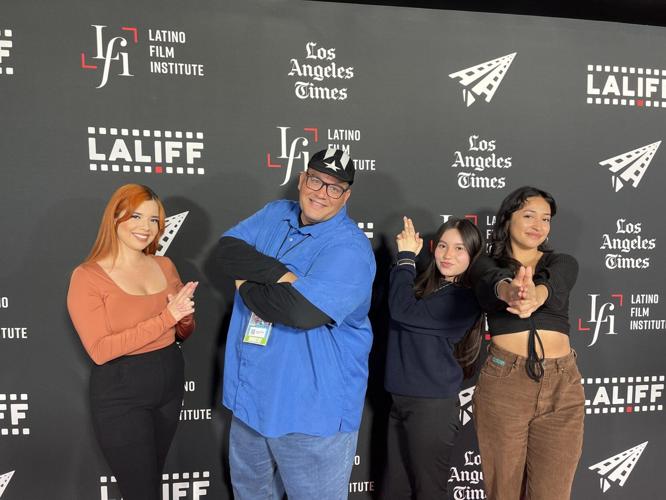
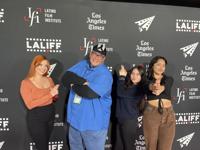

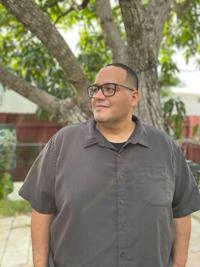



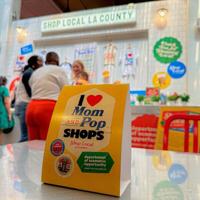



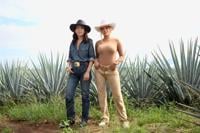


(0) comments
Welcome to the discussion.
Log In
Keep it Clean. Please avoid obscene, vulgar, lewd, racist or sexually-oriented language.
PLEASE TURN OFF YOUR CAPS LOCK.
Don't Threaten. Threats of harming another person will not be tolerated.
Be Truthful. Don't knowingly lie about anyone or anything.
Be Nice. No racism, sexism or any sort of -ism that is degrading to another person.
Be Proactive. Use the 'Report' link on each comment to let us know of abusive posts.
Share with Us. We'd love to hear eyewitness accounts, the history behind an article.